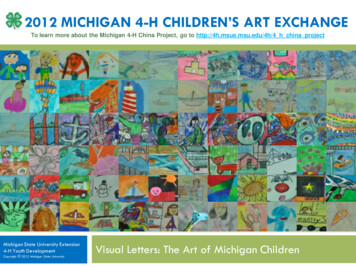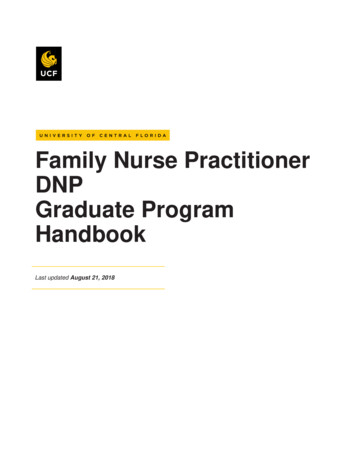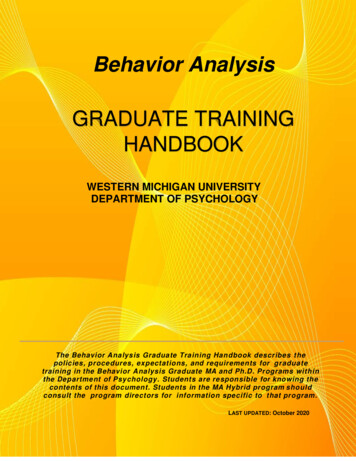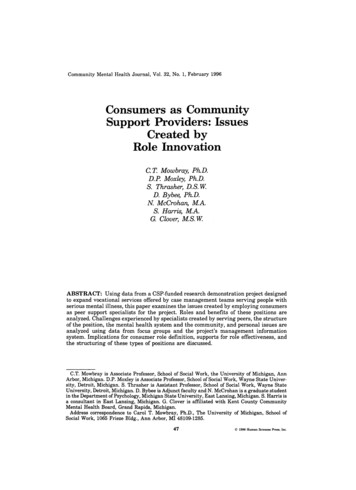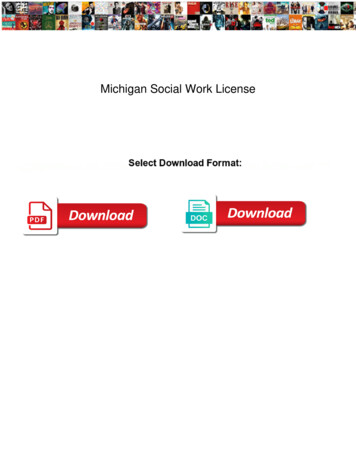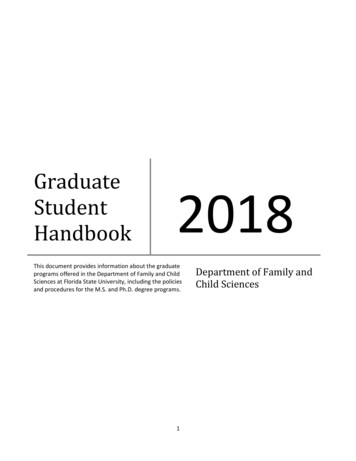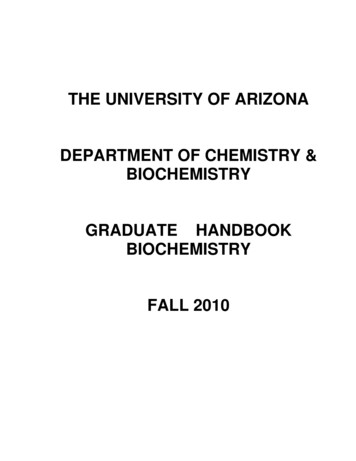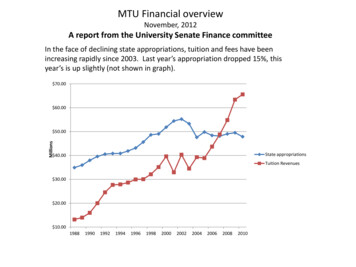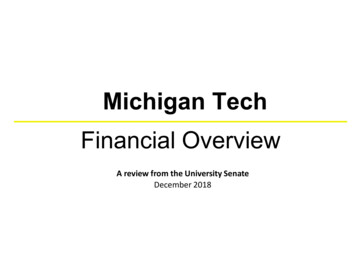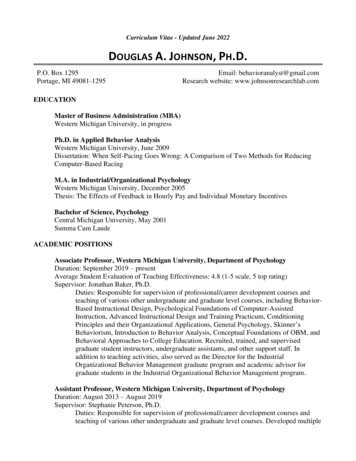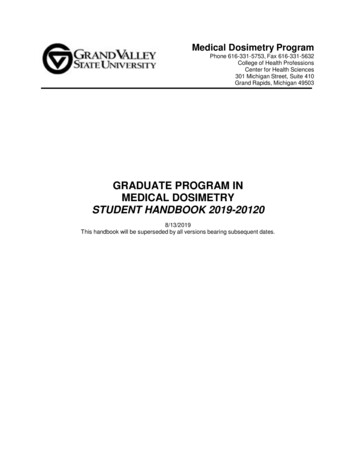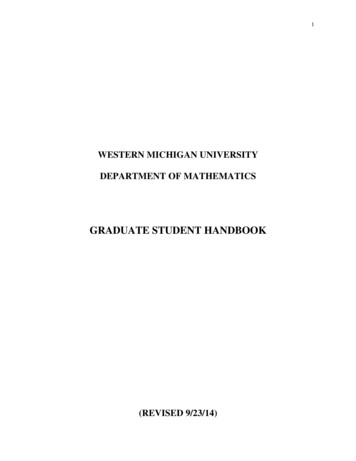
Transcription
1WESTERN MICHIGAN UNIVERSITYDEPARTMENT OF MATHEMATICSGRADUATE STUDENT HANDBOOK(REVISED 9/23/14)
2GRADUATE STUDENT HANDBOOKTable of ContentsI. Facts about Western Michigan University and its Mathematics Department . p. 4II. Organization of the Department . p. 6III. Organization of Everett Tower and Rood Hall . p. 7Departmental ClassroomsDepartmental OfficesGraduate Assistant OfficesFaculty OfficesIV. Resources and Opportunities for all Graduate Students . p. 9University Computer ServicesWaldo LibraryProfessional Society MembershipsMath Club and Math Honors SocietyV. Graduate Student Appointments . p. 10University FellowshipsWMU Dissertation Completion FellowshipsAppointments Available in the DepartmentGraduate Teaching AssistantshipsDoctoral AssociateshipsGeneral RequirementsRenewalPartial or One Semester AppointmentsSummer I/Summer II Graduate Assistant AppointmentsVI. Permanent Program of Study and Annual Review of Graduate Students . p. 13Planning Your ProgramProgram of StudyAnnual ReviewAnnual Review of Masters StudentsAnnual Review of Students in a Doctoral ProgramVII. Information for Graduate Students Who Hold an Assistantship, Associateship, . p. 15or FellowshipIdentificationFees and TuitionHousing
3LibraryParkingCampus BookstoreKeysDurationVIII. The Ph.D. Comprehensive Examination . p. 16PurposeExamination AreasExamination FilesWriting and Proctoring ExamsEvaluation of the ExamIX. Guidelines for the Directed Teaching Requirement for Doctoral Students . p. 18X. The Doctoral Dissertation Process in the Department of Mathematics p. 20XI. Research Tool and Foreign Language Requirements for the Ph.D. Degree p. 23in the Department of MathematicsXII. Seminars and Colloquia .p. 24SeminarsThe Department ColloquiumMathClub TalksThe TA SeminarXIII. Suggestions for Teaching Assistants .p. 26Your First Day of ClassStudent AttendanceHomeworkTesting ProceduresGradesDisruptive Students and CheatingUnable to TeachTeaching TechniquesEvaluation of Your TeachingAppendix A: Doctorates Awarded in the Department of Mathematics and Statistics .p. 33(later the Department of Mathematics), and in the Department ofStatisticsAppendix B: Doctorates Awarded since 1969 . . p. 36Appendix C: 2014/15 Department of Mathematics Faculty .p. 42
4I. FACTS ABOUT WESTERN MICHIGAN UNIVERSITYAND THE MATHEMATICS DEPARTMENTWestern Michigan University is a dynamic, student-centered research university with anenrollment of nearly 25,000. WMU is focused on delivering high-quality undergraduateinstruction, advancing its growing graduate division and fostering significant research activities.The Carnegie Foundation for the Advancement of Teaching places WMU among the 76 publicinstitutions in the nation designated as research universities with high research activity. U.S.News & World Report’s annual ranking of American colleges and universities includes WMU asone of the nation’s top-100 public universities.Undergraduate students at WMU may choose from 145program offerings while graduatestudents may select from 71 master’s, one specialist and 30 doctoral programs. A number ofprograms at both the undergraduate and graduate levels have attained national recognition. Alsoenriching the quality of campus life are some 275 registered student organizations and a fullarray of NCAA Division IA intercollegiate athletic teams.The University’s commitment to the discovery and dissemination of new knowledge and insighthas resulted in initiatives that reward faculty and student research, scholarship and creativeactivity. In a typical year, WMU faculty and staff conduct 30 to 40 million in externallyfunded research on topics ranging from nuclear physics and specialized education to developingtechnology that enables more efficient flight and more environmentally friendly publictransportation. Instructional programs are designed to increase students’ capacity for learningand service to society, as well as meet the needs of an increasingly diverse student population.WMU is Michigan’s fourth largest higher education institution, attracting a diverse andculturally rich student body from across the United States and some 80 other countries. Its nearly900 full-time faculty members have been trained at some of the world’s finest institutions andthey bring to the University a global perspective that enhances the learning environment.WMU’s campuses encompass more than 1,200 acres and 151 buildings. Its main campus, closeto downtown Kalamazoo, features some of the finest instructional and performance facilities inthe Midwest as well as residence halls equipped to house more than 5,700 students. TheUniversity’s College of Engineering and Applied Sciences and the Business Technology andResearch Park are located three miles away on the Parkview Campus, while its nationallyrecognized College of Aviation is based at the W.K. Kellogg Airport in nearby Battle Creek.Among WMU’s newest instructional centers are the College of Health and Human Servicesbuilding, the Chemistry Building, and Sangren Hall, each a state-of-the-art facility that housesspecialized research labs, classrooms and lecture spaces, and faculty office space.The University also has an off-campus study site in Kalamazoo and eight branch campusesaround the state, all of which provide primarily graduate and professional education. Branchcampuses are located in Battle Creek, Benton Harbor-St. Joseph, Grand Rapids, Lansing,Muskegon-Holland, South Haven and Traverse City.
5Founded in 1903, WMU rapidly grew from a regional teachers college to an internationallyregarded institution of higher education. What was once Western Michigan College becameWestern Michigan University in 1957, when the state designated it as the fourth public universityin Michigan.The Department of Mathematics is one of the twelve original departments of Western StateNormal School. Its first chair was John P. Everett for whom Everett Tower is named. Paul Roodwas the first chair of the Physics Department. The Department of Mathematics has threeundergraduate majors: applied mathematics, general mathematics, and secondary mathematicseducation. There are four undergraduate minors: actuarial sciences, elementary and middleschool teaching, secondary mathematics teaching, and general mathematics. The department hasthree master’s programs: applied and computational mathematics, mathematics, and mathematicseducation. There are two doctoral programs, one in mathematics and the other in K-12mathematics education. Additionally within the doctoral program for mathematics there is aspecialization for collegiate mathematics education. Our doctoral program was introduced in1968 and is one of the oldest at WMU. There are approximately 140 undergraduate mathematicsmajors at WMU and 60 mathematics graduate students.Our department is a small, friendly community with open and accessible professors. Ourgraduate students receive a considerable amount of individualized attention and encouragementfrom the faculty. Being a graduate student at WMU provides ample opportunities to gainexperience in teaching, supervising undergraduate research, and interning with local firms. Ourgraduate experience provides a student with well-rounded career training.Graduate students from Western Michigan University have been very successful in findingemployment and are well prepared for a career in academia, business, and other institutions. Arecent report by the Society for Industrial and Applied Mathematics (SIAM) indicates about 25%of math Ph.D.'s and 44% of master's graduates have positions in either government or industry.Mathematicians are sought because of their ability to think analytically, deal with complexity,develop models, and formulate and solve problems. Mathematicians are employed by companiesin engineering research, computer services, software, electronics, aerospace, transportation,insurance, financial services, chemistry, pharmaceuticals, and others. A list of all students whohave received doctorates from the WMU Department of Mathematics and their initial or currentemployers is given in Appendix B.
6II. ORGANIZATION OF THE DEPARTMENTThe Department Chair has the administrative responsibility for the department and is the officialrepresentative of the department to the university. The current Chair is Professor GeneFreudenburg.The Chair is assisted by two Associate Chairs who jointly coordinate the work the InstructionCommittee, one of six standing committees within the department. Work within the departmentis also guided by three elected faculty members who serve for three-year rotating terms on theExecutive Committee. Ex officio members of the Executive Committee are Chairs of theAssessment, Curriculum, and Graduate Committees. A separate standing committee serves thedepartment in determining Undergraduate Awards and Scholarships.Although the majority of the policies and major decisions is made by the entire department,discussions and recommendations for administrative policies are usually initiated by theExecutive Committee.Policies of concern to the graduate and undergraduate programs are primarily initiated in theCurriculum Committee. The Instruction Committee is responsible for appointing and overseeingthe teaching performance of teaching assistants and doctoral associates. Graduate studentsshould refer all questions and matters of concern regarding their teaching duties and performanceto their advisors or the Associate Chair for Instruction (presently, Professor Annegret Paul). TheGraduate Committee is responsible for appointing and overseeing all parts of the academicperformance of teaching assistants and doctoral associates. Graduate students should refer allquestions and matters of concern regarding their academic standing and program progress totheir advisors or the Chair of the Graduate Committee (presently, Professor Steven Ziebarth).The Graduate Committee also handles all appeals associated academic issues that may arisebetween graduate students and mathematics department faculty.The Assessment Committee collects and analyzes data on department programs in order toimprove those programs.The Undergraduate Awards and Scholarship Committee, as the name suggests, choosesundergraduate awards and scholarships. Graduate awards are determined jointly the InstructionCommittee and the Graduate Committee.
7III. ORGANIZATION OF EVERETT TOWER AND ROOD HALLDepartmental ClassroomsDepartmental classrooms are generally located in Rood Hall. Occasionally 6620 Everett is usedfor graduate courses. Some classrooms in Sangren Hall, Schneider Hall, Knauss Hall, BrownHall, and Wood Hall are also used.Departmental OfficesThe Departmental offices are located in the central portion of the third floor of Everett Tower.These include the main office (3319) where part of the secretarial staff is located. The studenthelp are in 3319 Everett. The administrative assistants to the chair are Ms. Sue Simons (3318Everett) and Mr. Steve Culver (3322 Everett). Mr. Culver works with the Associate Chairs indrawing up teaching assignments each term. The Graduate Secretary is Ms. Rebecca Powers(3325 Everett). The Office Assistant is Ms. Cathie Wilson (3317 Everett). The director of thedepartment’s developmental mathematics program (Math 1090, 1100, and 1110) is Dr. KirstyEisenhart (3326 Everett).Faculty, Teaching Assistant, Doctoral Associate, Instructor, and Part-time Instructor mailboxesare in the main departmental office (3319). This office is typically open Monday through Fridayfrom 8 am to noon, and from 1 pm to 5 pm. Offices are closed when the University is closed andstudents should consult the official Western Michigan University calendar for dates of closureeach semester. However, administrative offices are typically open when classes are not in session(e.g., exam weeks, certain semester break weeks, etc.).Graduate Assistant OfficesOffices for graduate assistants are on the 3rd, 4th, 5th, and 6th floors of Everett Tower and severaloffices in Rood Hall. Mailboxes for Mathematics Teaching Assistants are located in Room3319, Everett Tower.Keys to your offices are obtained from the Graduate Secretary, 3325 Everett Tower, or atOrientation. Also, you will be issued a PASSKEY that will open the classrooms, the kitchen onthe 6th floor, and conference and seminar rooms. The department’s policy on telephone use willbe covered during the orientation. Generally, Graduate Assistants do not have phones in theiroffices. There is a phone in 3319 Everett, which you will need permission to use for longdistance calls. This is reserved only for returning calls to your students. Phones for local callsare located in the 5th-floor printer room (5515 Everett) and in the 6th-floor printer room (6612Everett). Campus calls are made by dialing 7 and the last four digits of a campus phone number.Local calls require first dialing 9, then the entire 7-digit number. The telephones in the computerrooms cannot be used for long-distance calls, and off-campus calls should be kept to a minimumsince the Department is charged for each such call.
8A scholarly atmosphere should be maintained in your offices. This is your place of employmentwhere you may on occasion meet with colleagues, your professors, and your students.According to the department policy, when you are meeting with a student in your office, theoffice door should be wide open. Furthermore, you should avoid any behavior that might beconstrued as unprofessional or harassing. Smoking is prohibited in all classrooms, offices, andbuildings in the College of Arts and Sciences.Graduate Assistants are paid every two weeks. You can choose to receive your pay on a paycard, issued by Payroll Services, or by direct-deposit into your bank account. No paper checksare printed. Problems or questions concerning payroll should be referred to Mrs. RebeccaPowers or Ms. Sue Simons.Textbooks and course outlines for the courses you teach can be obtained from Mrs. CathieWilson. It is very important that you follow course outlines in consultation with yoursupervising professor. You must attend all meetings for your area (the course that you areteaching). Part of the evaluation on your contract renewal is dependent on your attendance ofthese meetings.Faculty OfficesFaculty offices are on floors 3 through 6 of Everett Tower. There are conference rooms on somefloors. They can be reserved for giving a make-up test or for a review session, etc. Theconference rooms should not be used for studying. The Alavi Commons Room on the 6th floor isthe location of most seminars and colloquia.
9IV. RESOURCES AND OPPORTUNITIES FOR ALL GRADUATE STUDENTSWaldo LibraryWestern Michigan University maintains a large collection of mathematical research literature.Extensive holdings allow for direct access to original sources. Ongoing acquisitions andsubscriptions (over 200 major world-wide mathematical journals) keep the collection up to date.This collection is housed in Waldo Library. The library also provides extensive electronicresources, such as data bases for journal articles. Interlibrary loans are offered as well. Severalonline search engines are available to access research materials through the WMU librarysystem.University Computer ServicesUniversity Computer Services is located in the building connected to Waldo Library. It has largecomputer lab and a walk-in technical support desk. The Department has several workstations foradvanced graduate work and research as well as computers in the Arts and Sciences ComputerLab for faculty and student use (both undergraduate and graduate). Additional informationregarding these facilities will be made available at the orientation. The Arts and SciencesComputer Lab is located in Rood Hall, schedules will be placed in your mailboxes.Professional Society MembershipsGraduate students are eligible for free membership in SIAM (Society for Industrial and AppliedMathematics). Membership in such an organization provides a window to the field ofmathematics outside WMU. Additional benefits include discounts on books and deeplydiscounted or free subscriptions to journals. For further information and a link to the applicationform go to http://www.siam.org/students/memberships.phpMath Club and Math Honors SocietyThe MathClub organizes a variety of events including a weekly brown bag lunch, mathematicaltalks aimed at students, and social gatherings. Events are free and open to all. A schedule can befound at http://www.wmich.edu/mathclub/calendar.html. Students are encouraged to give talksaccessible to undergraduate and graduate mathematics students. (Current Graduate Advisors forMathClub are Professor Niloufer Mackey and Professor Steven Ziebarth)The Department is also home to the Michigan Epsilon Chapter of Pi Mu Epsilon, a nationalhonorary mathematics society. You can check if you are eligible for membership l. Applications are solicited twice per yearduring the fall and spring semesters. An induction ceremony and banquet follow each selectionof successful applicants.
10V. GRADUATE STUDENT APPOINTMENTSUniversity FellowshipsUniversity Fellowships are available from the Graduate College for outstanding studentsbeginning a Master's degree program. Application forms, transcripts and letters ofrecommendation must be submitted to The Graduate College by 15 February. Students inmathematics and statistics applying for a University Fellowship are also encouraged to apply forone or more of the other appointments described below. Additional information on UniversityFellowships and other funding opportunities can be found at the following website:http://www.wmich.edu/grad/funding.html.WMU Dissertation Completion FellowshipsA limited number of Dissertation Fellowships are available, in open competition and on the basisof superior scholarly achievement. Recipients are provided with service-free stipends for oneyear to assist them in completing their dissertation. There is no service obligation with adissertation fellowship. To be eligible, an applicant must be a doctoral candidate who candemonstrate superior academic achievement, and have a record of timely and steady progresstoward degree completion. Applicants must have completed all requirements for the degreeexcept the dissertation, and must have an accepted dissertation proposal. Selection criteria willinclude a superior academic record (scholarly excellence is the most important criterion inselecting fellowship recipients), a dissertation proposal which holds the promise of contributingto the body of knowledge and literature in the discipline, and a realistic expectation that thedissertation will be completed within the time period of the fellowship. For more details, consultthe Graduate College website: s Available in the DepartmentThe following appointments are available on a competitive basis for students in the Departmentof Mathematics. Applications may be made for more than one of the following. However, astudent may hold only one appointment or equivalent, at a time. Occasionally an appointment isdivided between two or more students.Graduate Teaching Assistantships are available from the Department of Mathematics. Fornew graduate teaching assistantships the application forms, transcripts and letters ofrecommendation should be submitted to the Department of Mathematics by February 15.Applications submitted after that date will be considered only if there are openings. A studentholding an assistantship is required to perform 20 hours of service per week in the departmentand enroll in at least six-credit hours per semester. The assistantship will pay the full tuition, notincluding enrollment fees. No summer credit is offered or required with this appointment.
11Doctoral Associateships are offered to some outstanding doctoral students admitted to doctoralprograms (the number is limited by college and department funding allocations). A studentholding an associateship is required to perform 20 hours of service per week in the department.Enrollment of at least six credits per semester and three credits in the summer (typically, duringthe Summer I session) is required. The associateship will pay the full tuition, not includingenrollment fees. The recommendation and appointment for these associateships is made by theDepartment of Mathematics.The Erdős Memorial Scholarships of Graduate Study may be offered to graduate teachingassistants and doctoral associates, based on merit. The scholarship consists of 4000 for anacademic year, to be added to the usual graduate support. The department reviews applicantsbased on their undergraduate performance, and their performance at WMU (for returningstudents), both as a student and as a teaching assistant. Some scholarships are reserved for newgraduate students. The scholarship is awarded for one academic year. Due to the limited numberof scholarships available, a student should not expect to continue receiving the scholarshipduring the following year.General RequirementsThe general requirements of a graduate student who holds an appointment from the Departmentof Mathematics (Graduate Assistantship or Associateship) are as follows:a.The student must be admitted to one of the graduate programs in the Department ofMathematics. Exceptions may occasionally be made, but only with the approval of theGraduate Committee and the Chairperson of the Department of Mathematics.b.The student must complete at least 6-credit hours of acceptable course work in his/herprogram each semester, and (if holding an associateship), three hours in the summer. Thestudent needs prior permission from the Graduate Committee for taking more than 3 coursesper semester.c.The student must maintain at least a 3.0 grade point average in all coursework. Failureto meet this criterion results in automatic academic probation until grades insubsequent coursework are sufficient to raise the GPA above this threshold. Twosuccessive semesters on academic probation will result in revocation of theappointment.d.The student with a graduate assistantship, associateship or a fellowship must performsatisfactorily in the assigned teaching and other responsibilities.e.The student shall not engage in regular outside employment during the term of theappointment. Any temporary or occasional outside employment (either on campus or offcampus) must be approved by the Chair of the Department.
12RenewalA graduate student who has received an appointment from the Department of Mathematics or hasreceived a University Fellowship may normally expect to receive continued support to theconclusion of his/her program (see (c) below). A renewal appointment will normally be giventhe student provided the following conditions are met.a.The student remains in a graduate program in the Department of Mathematics. A studentwho switches programs inside the department, will typically receive continued support,provided that the other conditions are met.b.The student has satisfactorily fulfilled the General Requirements outlined above. For thepurpose of requirement b, above, an Audit or Withdrawal does not count toward therequired 6 hours of credit per semester. An Incomplete will count only after it has beenremoved and replaced by a grade. Exceptions may only be made with the approval of theDepartment Chairperson.c.The student will not normally be supported for more than a total of two years forMaster’s level programs, or for more than a total of five years for all programs leadingto a Doctoral degree.One Semester AppointmentsOne-semester appointments may be made if appropriate. Normally a student with a onesemester appointment will be expected to fulfill all of the requirements specified for studentswith whole year appointments.Summer I /Summer II Graduate Student AppointmentsGraduate Assistants who have held an academic year appointment and have not yet completedtheir program may be offered a Summer I or Summer II session teaching appointment, based onavailability of such positions. Priority will be given to Doctoral Associates. Considerations forthese appointments are: academic progress at WMU, faculty recommendations, and whether thestudent has accepted an assistantship for the following year.In all cases, satisfactory past teaching performance and adequate progress towards finishing thegraduate program are both necessary requirements.Final decisions about summer appointments will be made by the Chairperson of the department,taking into account program needs, as well as student financial needs whenever necessary andappropriate.
13VI. PERMANENT PROGRAM OF STUDY AND ANNUAL REVIEW OF GRADUATESTUDENTSPlanning Your ProgramBefore signing up for classes, you must meet with your academic advisor to (at least informally)plan your program. Although the advisor is the expert on what is required for the completion ofyour chosen degree, most of the information is readily available in the online graduate catalog.You will be able to make better decisions and avoid mistakes if you know as much as possibleabout the rules, requirements, and policies associated with the degree you seek. An importantthing to know is that there are two main sets of rules to pay attention to: the departmental degreepolicy, and university policy.To view the department requirements, go to the graduate catalog, and find your particular degreeprogram under “Departments and Programs” on the bar at the left side of the page.To view the university policy, look at the section “Academic Policies,” in the graduate catalog,in particular the subsection “Graduation Requirements,” which includes information such as thenumber and level (5000 or 6000 ) of credits required, as well as information about requiredgrades. For example, for graduate study, no course with a grade below “C” will be countedtowards the degree (however, it will count towards your grade point average).One valuable resource for planning your program is the “Six-Year Plan”, which is a tentativeschedule of all courses numbered 4000 and above. It can be found under “Resources” on theDepartment Web Page. Many of the required course sequences are offered only every other year,so it is important to consult this plan from the start and revisit it often as you work through yourprogram in the event that scheduled offerings may change for some reason.If you are a student in one of the Ph.D. programs, it is recommended that you plan your programin such a way that you can finish all three comprehensive exams by the end of your third year atthe latest.Program of StudyEarly in your program you, with your advisor, must complete and submit to the DepartmentGraduate Secretary a Permanent Program of Study. Forms are available online or from theGraduate Secretary. Students in one of the masters programs must file this form by the end ofthe second semester, doctoral students by the end of the fourth semester of their program. Ifchanges to the Program of Study are necessary at a later point in time, the document may beupdated and resubmitted. The Graduate Secretary submits these forms to the Registrar and, afteryou apply for graduation, the graduation auditor will use this document to check whether allrequirements for the degree have been met.
14Annual Review of Graduate StudentsIn order to assist you in the timely completion of your program of study, and to advise you ofyour progress, the department Graduate Committee conducts an annual review of all graduatestudents (in both the masters programs and the programs leading to a doctoral degree), during thespring semester. In particular, the Graduate Committee will look at whether you are maintainingthe required GPA, and whether you are making timely and satisfactory progress in all aspects ofyour program. For students in one of the masters programs, this mainly involves progress incourse work. For students in one of the programs leading to a doctoral degree, this includesprogress in course work, the comprehensive exams, directed teaching, the proposal defense,research tools, and dissertation research. Any professional development activities will becredited as progress as well.Both you and your advisor are asked to independently complete the annual review form thenmeet to discuss them. It is your responsibility to schedule an appointment with your advisor todiscuss the forms. At the conclusion of this meeting, both forms must be signed by you and youradvisor, and submitted to the Graduate Secretary by February 1, along with an up-to-dateProgram of Study. The forms are available from the Department Graduate Secretary, or from thedepartment web page.The Graduate Committee will then use the forms to make a recommendation regarding yourprogress. You and your advisor will be informed of the outcome by March 15.There are three possible outcomes of the review. The committee may recommend the followingregarding your enrollment:1. Continuation2. Continuation with Reservations3. DismissalIf the recommendation is “continuation with reservations,” you must then meet with your advisorto discuss strategies to address the reservations, and to compose a (written or electronic)response to the Graduate Committee. This response must be submitted to the GraduateCommittee by March 31. The committee’s report, along with your response, will be added toyour file. At the next annual review, you must show adequate progre
The Departmental offices are located in the central portion of the third floor of Everett Tower. These include the main office (3319) where part of the secretarial staff is located. The student help are in 3319 Everett. The administrative assistants to the chair are Ms. Sue Simons (3318 Everett) and Mr. Steve Culver (3322 Everett). Mr.
